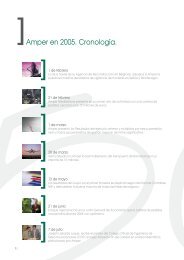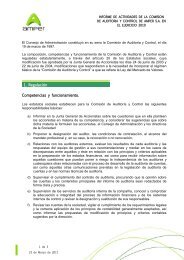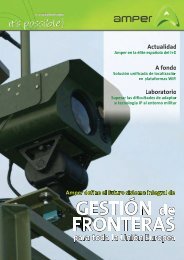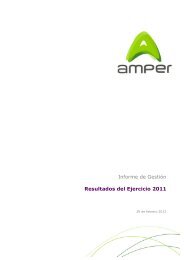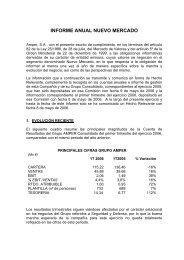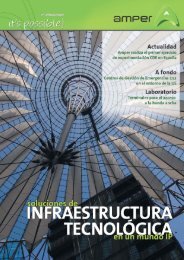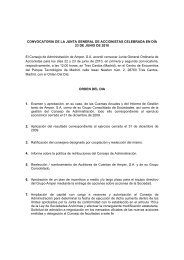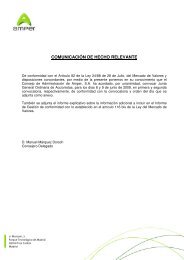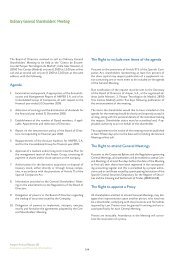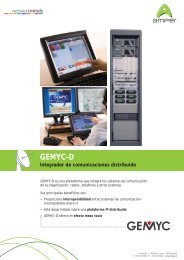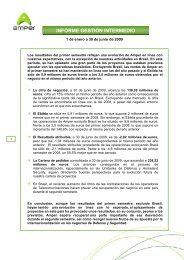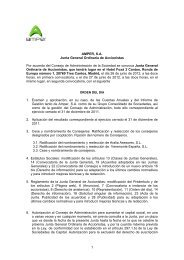AMPER, SA and Subsidiaries Consolidated Financial Statements for ...
AMPER, SA and Subsidiaries Consolidated Financial Statements for ...
AMPER, SA and Subsidiaries Consolidated Financial Statements for ...
Create successful ePaper yourself
Turn your PDF publications into a flip-book with our unique Google optimized e-Paper software.
Procedures <strong>for</strong> reviewing <strong>and</strong> approving financial in<strong>for</strong>mation <strong>and</strong> the description of the<br />
ICSFI to be published in the stock markets, stating who are the people responsible <strong>for</strong><br />
these.<br />
The Amper Group’s procedures <strong>for</strong> reviewing <strong>and</strong> approving financial in<strong>for</strong>mation to be<br />
published in the stock markets begin with the revision <strong>and</strong> certification, on the part of the Head<br />
of Finance at each subsidiary, of the financial in<strong>for</strong>mation reported in each quarter. The<br />
individual <strong>and</strong> consolidated annual accounts, the half-yearly financial reports, <strong>and</strong> the financial<br />
in<strong>for</strong>mation contained in Amper’s quarterly statements are revised <strong>and</strong> certified by the<br />
Economic-<strong>Financial</strong> Management <strong>and</strong> then made known to the Managing Director of the Group,<br />
be<strong>for</strong>e being sent <strong>for</strong> the approval of the Board of Directors. Likewise, the Auditing Commission<br />
has established a protocol <strong>for</strong> reviewing this in<strong>for</strong>mation prior its review by the Board of<br />
Directors. The review protocol used by the Auditing Commission establishes that the in<strong>for</strong>mation<br />
is read <strong>and</strong> then discussed with the Economic-<strong>Financial</strong> Management, the Managing Director,<br />
Internal Auditing <strong>and</strong>, when applicable, any External Auditors.<br />
Likewise, as regards the process of reviewing <strong>and</strong> supervising the ICSFI, as stated in section 1,<br />
in the last quarter of 2011 the Board of Directors of Amper, S.A. approved a new framework<br />
policy that will be the basis <strong>for</strong> any future developments of the internal control system <strong>for</strong><br />
financial in<strong>for</strong>mation (ICSFI) ("Guidelines of the ICSFI of the Amper Group). Among other<br />
issues, this framework policy places the ultimate responsibility <strong>for</strong> the existence of an adequate<br />
ICSFI at Amper, S.A. with its Board of Directors. This policy also establishes responsibility <strong>for</strong> its<br />
practical implementation with the Economic-<strong>Financial</strong> Management, while its supervision is the<br />
responsibility of the Auditing Commission.<br />
INFORMATION AND COMMUNICATION<br />
A specific function that is responsible <strong>for</strong> maintaining the accounting policies up to date<br />
(accounting policies division or department), <strong>and</strong> <strong>for</strong> resolving any doubts or differences<br />
of opinion arising from the interpretation of the same, maintaining fluid communication<br />
with the operational heads of the organisation.<br />
Economic-<strong>Financial</strong> Management <strong>and</strong>, in particular, the Head of Consolidation <strong>and</strong> Reporting<br />
are responsible <strong>for</strong> identifying, defining <strong>and</strong> updating any accounting policies that affect the<br />
Group, as well as <strong>for</strong> resolving any doubts or differences of opinion arising from the<br />
interpretation or application of the accounting policies in any of the Group’s subsidiary<br />
companies.<br />
Updated accounting policies manual to be provided to the units that the entity operates<br />
through.<br />
The Amper Group has a manual of accounting policies (implemented in the 2011 fiscal year)<br />
that describes the policies to follow <strong>for</strong> the Group’s typical types of transactions. The need to<br />
have such an accounting manual became evident in the 2011 fiscal year when the Group<br />
acquired the company El<strong>and</strong>ia with all of its subsidiaries, given that in previous years there was<br />
no relevant dispersion of reporting units.



